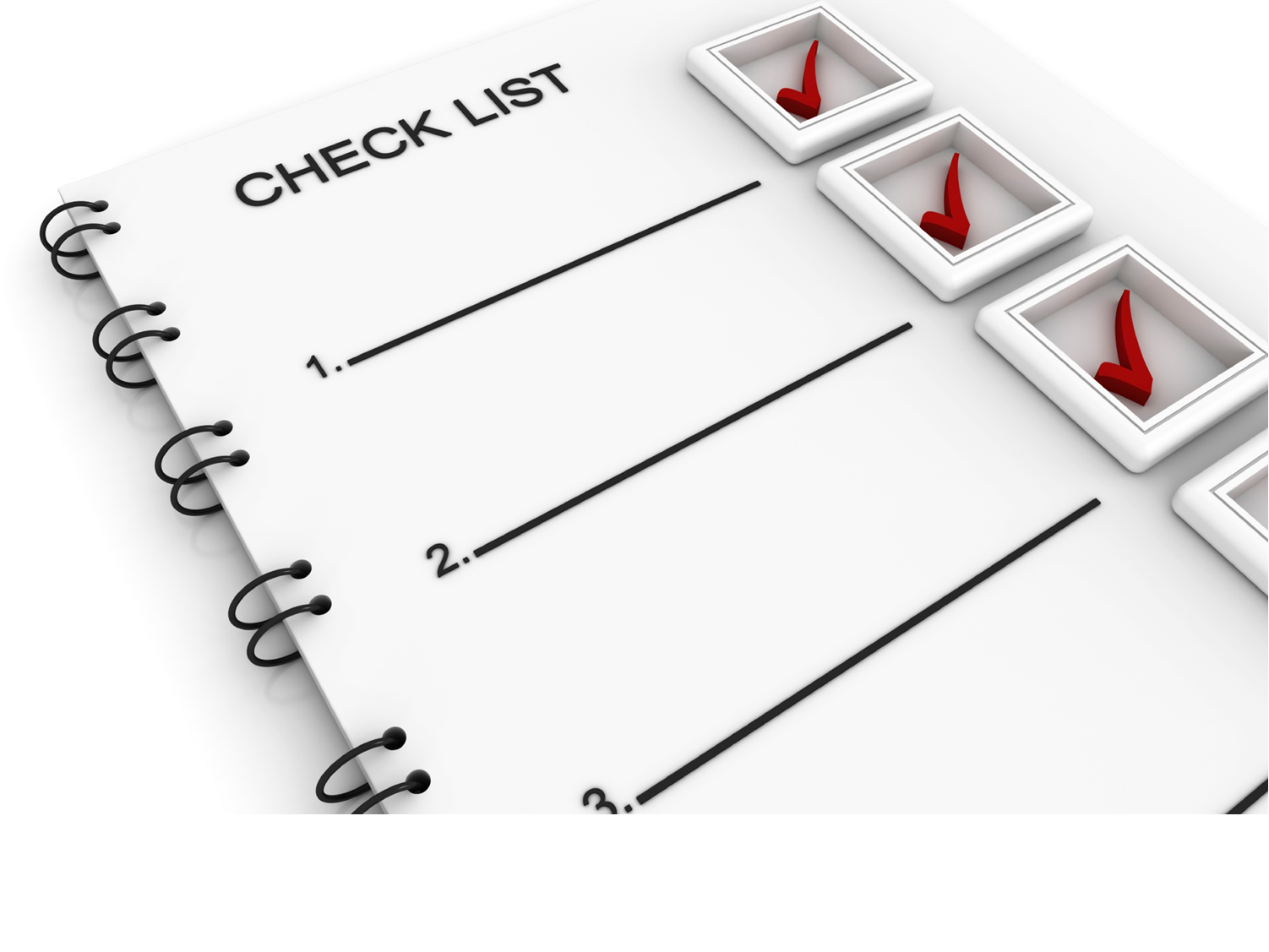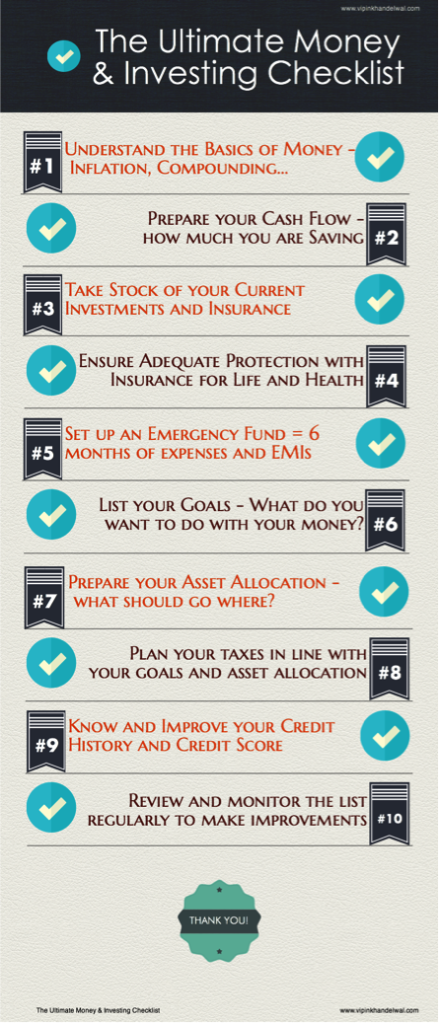Lately I have been receiving several questions on “where do I invest xyz amount?”. Typically, the sender wants to know the funds for starting an SIP or making a lump sum investment in mutual funds.
The issue is that this approach is half-baked. There is an attempt to jump straight to investments not understanding that there are prior steps to be completed before addressing the investment question.
Typically this results in random acts of investments (buying this and that) without knowing whether something is really a fit. Such investments can hold back your investment portfolio from delivering the right outcomes. Buying traditional insurance policies and choosing dividend option in an equity mutual fund are examples of such nonsense.
As far as money and investments are concerned, one needs to take a step by step approach. Personally, I would like to see the initial steps marked complete before the investment question is raised.
One tool that can be of great help to you is a checklist.
A checklist is simple but absolutely terrific management tool for almost every activity that involves a process. It is almost magical in the way it ensures completeness of tasks.
So, I have put together the key activities related to money and investing in the form of a checklist for you. Go through it and all you have to ensure is that you tick mark every item before you proceed to the next one. Peace of mind – guaranteed!
While this checklist is most useful for someone early in his/her career, it can be used by anyone who wants to get his/her finances in shape. Simply put, an investing checklist keeps you on track.
Here’s the money and investing checklist.
You can download the infographic to your computer or mobile phone.
Your 10 point money and investing checklist for a stress-free financial life
Let’s understand how you can work on each of the points in the checklist.
- Understand the basics of money – These are some ground rules which will enable you to understand the landscape of money and investments. Basics of inflation, interest, compounding are important to be successful as an investor. By being aware of these basics, you can take much better decisions with your money and investments.
- Prepare a Cash Flow – Know that you are saving – Prepare a Cash Flow where you will list down your incomes and expenses and note the difference between the two. Ensure that you are saving enough money regularly. The rule is that you should save first and then spend from what is left. But I will that to you to decide, which approach works for you.
- Take stock of your current investments and insurance
- Know where your current investments are. Make a note of all your current investments including your Provident Fund, PPF, Bank FDs, etc.
- Similarly, list all the insurance (life, health, accident) policies that you have. The intention is to find out how much cover do you have for life and health.
- Ensure that you are adequately covered / insured for Life and Health – Both are very important and should have the first call on your money. Sometimes insurance is treated as an avoidable expense, but the fact is, it is not. For life insurance, there are multiple approaches, that can be followed to figure out the cover that you should buy. Here are two. As for health, having a personal cover is important. At least a Rs. 5 lac family floater medical insurance would be ideal to begin with.
- Set up an Emergency Fund – You never know when emergency strikes and for that reason alone you need to keep aside money. The thumb rule is that you should have an emergency fund which is equal to minimum 6 months of your expenses and EMIs but you can choose a higher number too. This fund should be available to you at short notice.
- List your goals – No one can stop a person who knows what she wants. There is something amazing about clarity of mind and purpose. It focuses our efforts towards the purpose and provides us a touchstone on which every single act can be validated. Don’t underestimate the power of goals. They can transform you. When it comes to money, you can broadly divide your goals into 3 zones. Make your goals as specific as possible. Give names to your goals as also the time frame and the amount of money that you will need.
- Short term – whatever will need your money within 3 years. For example, to buy a car or going on a holiday.
- Medium term – the money that you will need between 3 to 7 years. For example, making a downpayment for your home.
- Long term – all those demands that will come up not before 7 years. For example, your retirement and your child’s education.
- Prepare your Asset Allocation – Now you are ready to take up the next important step in your checklist – Asset Allocation is a big deal.
- Money needed in the short term should be invested in no or very low risk instruments like your bank fixed deposits or debt mutual funds or short term bonds. Safety of money is a key principle here to decide which instruments.
- The money that can be placed for the medium term can be invested in low to medium risk instruments. Balanced funds or large cap equity funds can be a great choice.
- All the funds that you can set aside for the long term that is over 5 or 7 years can be invested in medium to high risk investments. Equity Funds fit the bill perfectly here.
- Plan your taxes and invest in line with your goals and asset allocation – Taxes are probably the first thing that hits a salaried individual and it is also the one that is most messed up. In the race to save taxes at the last moment, haphazard investments are made. In some cases, one just lets the taxes to eat up the income. Well, you can make smart investment decisions which can also help you save taxes. For example, you can use section 80C eligible items to fulfil a lot of this checklist’s requirements.
- Understand and Improve your Credit History and Score – Credit plays an important role in anyone’s life. You need credit to buy a home or a car or even sometimes for business purposes. The credit providers like banks or other finance companies give a lot of weightage to your credit history and credit scores. The better is it, better your chances to receive loans at favourable terms and rates. But then credit related mistakes are all too common. Unnecessary use of credit cards, revolving of credit at high rates not only add to the liabilities but also damage your credit profile reflected in your credit reports and scores. You should also ensure that you continue to have a favourable credit score. As per CIBIL, that score should be close to 800.
- Regular Reviews – A regular review of the cash flows, goals, asset allocation and credit will ensure that you stay on track to meet your goals in a time bound manner. A review will highlight any areas of improvement that need to be worked on. You may need to weed out underperforming investments, rebalance your portfolio as per your asset allocation or add to your insurance cover as the family grows in size. It would be helpful to seek expert professional advice in some cases.
So, that’s about it. This is a comprehensive checklist that you can follow to ensure that you not only avoid money related mistakes but also that you smoothly tread the path of financial freedom.
If you feel that this basic money and investing checklist could be helpful to someone you know, please do forward it to him/her too.
Between you and me: So, where are you on the checklist? Do share your thoughts in the comments. In another post, we will also look at an advanced checklist for investments.


Isn’t an FD the safest place for an emergency fund? It’s guaranteed by the government till ₹1 lac.
And if you choose SBI, I’m told that there’s a de-facto guarantee beyond this amount: the government won’t let SBI default. If SBI falls, the government falls, as I was told.
So would you suggest using an FD for the emergency fund?
To be clear, the above question was about FD vs a liquid fund. Thanks.
The points that you mention are valid. For quite a few investors, the tax adjusted returns in liquid funds
Appear better.